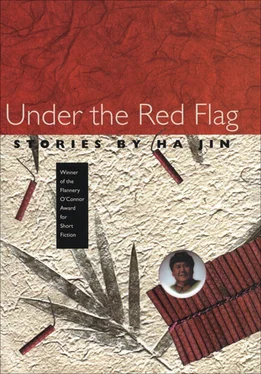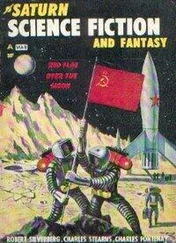Because Hong didn’t like any of the suitors, she began to focus her attention on their official positions. She remembered how prosperous and glorious the Chens had been when her father dominated Dismount Fort. The whole family had once taken a Russian jeep to Dalian City, the chauffeur obeying her father like a lapdog. She wanted people, especially those girls who hated and disparaged her, to look up to her again. Already the suitors without a presentable official position had retreated of their own accord; Feng Ping and Pang Hai emerged as the finalists. They knew Hong wanted to marry the vice-chairman-to-be, but neither of them could do anything to have himself elevated immediately, though they were both candidates for that position. All they could do now was force Hong to make her choice before the promotion materialized.
Feng Ping’s matchmaker, Aunt Lin, visited the Chens two days later. She wanted them to give a definitive answer. Holding the tea Hong had poured her, the old woman turned to Mrs. Chen. “We can’t wait anymore. You’ve got to let us know your decision in two or three days.” She put the cup on the desk and shrugged her scraggy shoulders.
“Can’t you give us another week?” Mrs. Chen said.
Aunt Lin sighed. “Only by agreeing to marry him before his promotion can Hong prove her love for Young Feng. He wants true love.”
“Then tell him, go to hell,” Hong said, her thin lips pursed.
“Shut up!” Mrs. Chen snapped at her daughter, and then turned to Aunt Lin. “She’s totally spoiled. She doesn’t mean it.”
“Of course not. No girl’s words mean business in her marriage. That’s why we parents arrange things for them. But you’ve got to give us an answer soon.”
At long last, the Chens agreed to make their decision in three days. Mrs. Chen was annoyed by her daughter’s lack of preference. In such a foggy situation the only reliable chart was your own heart, but Hong couldn’t feel anything. If pressed hard, she would say, “I don’t want to marry, all right?” But she was wrong. She had to choose one or the other of the outstanding young men, whom most girls in Dismount Fort would kill to marry. In her heart Hong knew she must never lose such an opportunity. After this village there won’t be the same inn, as the wise saying warns. But she felt sick at heart, wondering why people called a wedding “a Red Happy Event.” What was it that you should be happy about?
Unable to choose, on the third day the mother and the daughter resorted to drawing lots. Mrs. Chen wrote “Feng” and “Pang” separately on two scraps of paper and rolled them into two tiny balls. She put them into a teacup. Covering the mouth of the cup with her palm, she shook it and dropped the paper balls on the glossy brick bed. “Now you pick one, Hong. Be careful, the one you choose will be your husband.”
Hong shut her eyes and twisted the paper balls with her slim fingers, her face pale and her lips curled. “All right, I take this one.” She handed it to her mother.
Mrs. Chen unrolled it. “No, you picked the wrong one!” On the paper the character “Pang” stood proudly.
“It doesn’t matter,” Hong said. “I’m going to marry him.”
“Oh, my gut feeling is that Pang Hai is not going to be the chairman.”
“It’s too early to tell, Mom.” Hong thought Lilian would be pleased by this choice.
On the same day the Chens’ decision was known to most households in town. Pang Hai was elated. For him this was a good beginning. He felt his spine sturdier than before and even his heels seemed full of power when he walked. Of course he didn’t know how the Chens had reached the decision. He had always kept an amorous eye on Hong since he came to know that she wasn’t a bad girl at all and that the roll of bloody gauze only proved she was healthy and normal. As for the next step—the engagement, he hadn’t lost his head over the initial victory and was inclined to make everything as simple as possible. At this critical juncture of his official career, he kept firmly in mind Chairman Mao’s instruction: “We must always be modest and prudent and must, so to speak, tuck our tails between our legs.”
He sent his matchmaker, Aunt Zheng, to the Chens to seek understanding: the engagement ceremony would be plain and quiet, whereas the wedding would be customary and colorful. The Chens didn’t think it unreasonable, so it was settled.
The engagement dinner was held at the Pangs’ on August 1, Army Day. Only a few guests were present. Besides the members of the two families, there were the secretary and the director of the Harvest Fertilizer Plant, where Pang Hai’s father worked as a bulldozer driver. Aunt Zheng had also been invited, in addition to being presented a yard of woolen cloth by the Pangs as “a little keepsake.” The old woman wouldn’t take money from such a good family and meant to do Hai a free service. Unfortunately she was sick on the engagement day, unable to come and eat.
At the dinner Hai couldn’t help smiling at Hong, who would glare back. His eyes were so large they reminded her of an ox’s. When he placed a chicken leg in her plate, the chopsticks slipped off his hand, which was huge and veined.
In the beginning the two tables were quiet, and the only words that could be heard were “Eat, try this,” or “Fresh and crispy,” or “Good fish, so fat.” But after several rounds of sorghum liquor the men grew louder. The leaders of the fertilizer plant began talking of the housing program for their cadres and workers. Director Ma, a tall husky man, kept burping while drawing floor plans on the table with his fingers wet with alcohol. Liu, the stocky secretary, claimed he was so happy for the children that he must drink to his heart’s content. Then he clapped his palm on his fat lips, remembering this was not the wedding. It didn’t matter, however, because he would do that on October 1 when the young couple were scheduled to enter the bridechamber.
The older generation shook their heads again and again, sighing over how time was flying. It was as if yesterday when Hai and Hong had been small pupils in the Central Elementary School, but in the twinkling of an eye they became man and woman, ready to have their own children.
Mrs. Chen never liked the Pangs. Now and then she glanced at Mr. Pang and her son-in-law-to-be. They drank hard liquor with mugs and spat into an ashtray that sat right on the dining table. Mrs. Pang even sucked a mullet’s head before their guests. Hai’s siblings, a younger brother and an elder sister, who had a baby girl and a husband working in Sand County, were drinking Gold Star beer with the noise of an exuberant creek. Meanwhile, Hong was sipping apple wine and her face was pink and shimmering, which made her resemble a young bride. She liked the sautéed tree ears, so her chopsticks kept transporting them into her small mouth.
“Ah,” Director Ma cried and stood up. Before he could move a step he threw up—a yellowish shaft of liquid food splashed on the edge of the brick bed and the dirt floor. Immediately Mrs. Pang ran to the kitchen to get a bowl of vinegar to sober him up. Hong took a broom and a dustpan to remove the vomit. Hai’s sister was helping too.
“Old Pang,” Secretary Liu said, patting the bulldozer driver on the shoulder, “What a good daughter-in-law you have. See, she’s begun to work. Hai is a lucky young man, to have such a nice girl.” Then, giggling, he turned to Director Ma. “Old Ma, you’re no good. One mug can throw you down like a corpse.”
“Come, let’s drink!” Ma’s face was carmine, and he lifted Mrs. Chen’s mug, which still had some soda in it.
Immediately Hai poured in some cold water. Ma clinked mugs with Liu and they drank up. “Good liquor,” Ma said.
Читать дальше












